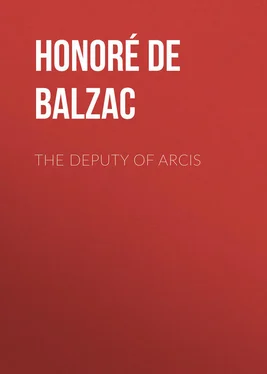Honoré Balzac - The Deputy of Arcis
Здесь есть возможность читать онлайн «Honoré Balzac - The Deputy of Arcis» — ознакомительный отрывок электронной книги совершенно бесплатно, а после прочтения отрывка купить полную версию. В некоторых случаях можно слушать аудио, скачать через торрент в формате fb2 и присутствует краткое содержание. Жанр: literature_19, foreign_antique, foreign_prose, на английском языке. Описание произведения, (предисловие) а так же отзывы посетителей доступны на портале библиотеки ЛибКат.
- Название:The Deputy of Arcis
- Автор:
- Жанр:
- Год:неизвестен
- ISBN:нет данных
- Рейтинг книги:3 / 5. Голосов: 1
-
Избранное:Добавить в избранное
- Отзывы:
-
Ваша оценка:
- 60
- 1
- 2
- 3
- 4
- 5
The Deputy of Arcis: краткое содержание, описание и аннотация
Предлагаем к чтению аннотацию, описание, краткое содержание или предисловие (зависит от того, что написал сам автор книги «The Deputy of Arcis»). Если вы не нашли необходимую информацию о книге — напишите в комментариях, мы постараемся отыскать её.
The Deputy of Arcis — читать онлайн ознакомительный отрывок
Ниже представлен текст книги, разбитый по страницам. Система сохранения места последней прочитанной страницы, позволяет с удобством читать онлайн бесплатно книгу «The Deputy of Arcis», без необходимости каждый раз заново искать на чём Вы остановились. Поставьте закладку, и сможете в любой момент перейти на страницу, на которой закончили чтение.
Интервал:
Закладка:
“As usual, you and I are of the same opinion, father.”
“You can say that I have otherwise disposed of Cecile’s hand, and that will cut short all preposterous pretensions like that of Antonin Goulard. Little Vinet may offer himself, and he is preferable to the others who are smelling after the dot ; he has talent, and shrewdness, and he belongs to the Chargeboeufs by his mother; but he has too much character not to rule his wife, and he is young enough to make himself loved. You would perish between two sentiments – for I know you by heart, my child.”
“I shall be much embarrassed this evening at the Marions’ to know what to say,” remarked Severine.
“Well, then, my dear,” said her father, “send Madame Marion to me; I’ll talk to her.”
“I knew, father, that you were thinking of our future, but I had no idea you expected it to be so brilliant,” said Madame Beauvisage, taking the hands of the old man and kissing them.
“I have pondered the matter so deeply,” said Grevin, “that in 1831 I bought the Beauseant mansion in Paris, which you have probably seen.”
Madame de Beauvisage made a movement of surprise on hearing this secret, until then so carefully kept, but she did not interrupt her father.
“It will be my wedding present,” he went on. “In 1832 I let it for seven years to an Englishman for twenty-four thousand francs a year, – a pretty stroke of business; for it only cost me three hundred and twenty-five thousand francs, of which I thus recover nearly two hundred thousand. The lease ends in July of this year.”
Severine kissed her father on the forehead and on both cheeks. This last revelation so magnified her future that she was well-nigh dazzled.
“I shall advise my father,” she said to herself, as she recrossed the bridge, “to give only the reversion of that property to his grandchildren, and let me have the life-interest in it. I have no idea of letting my daughter and son-in-law turn me out of doors; they must live with me.”
At dessert, when the two women-servants were safely at their own dinner in the kitchen, and Madame Beauvisage was certain of not being overheard, she thought it advisable to give Cecile a little lecture.
“My daughter,” she said, “behave this evening with propriety, like a well-bred girl; and from this day forth be more sedate. Do not chatter heedlessly, and never walk alone with Monsieur Giguet, or Monsieur Olivier Vinet, or the sub-prefect, or Monsieur Martener, – in fact, with any one, not even Achille Pigoult. You will not marry any of the young men of Arcis, or of the department. Your fate is to shine in Paris. Therefore I shall now give you charming dresses, to accustom you to elegance. We can easily find out where the Princesse de Cadignan and the Marquise de Cinq-Cygne get their things. I mean that you shall cease to look provincial. You must practise the piano for three hours every day. I shall send for Monsieur Moise from Troyes until I know what master I ought to get from Paris. Your talents must all be developed, for you have only one year more of girlhood before you. Now I have warned you, and I shall see how you behave this evening. You must manage to keep Simon at a distance, but without coquetting with him.”
“Don’t be uneasy, mamma; I intend to adore the stranger .”
These words, which made Madame Beauvisage laugh, need some explanation.
“Ha! I haven’t seen him yet,” said Phileas, “but everybody is talking about him. When I want to know who he is, I shall send the corporal or Monsieur Groslier to ask him for his passport.”
There is no little town in France where, at a given time, the drama or the comedy of the stranger is not played. Often the stranger is an adventurer who makes dupes and departs, carrying with him the reputation of a woman, or the money of a family. Oftener the stranger is a real stranger, whose life remains mysterious long enough for the town to busy itself curiously about his words and deeds.
Now the probable accession to power of Simon Giguet was not the only serious event that was happening in Arcis. For the last two days the attention of the little town had been focussed on a personage just arrived, who proved to be the first Unknown of the present generation. The stranger was at this moment the subject of conversation in every household in the place. He was the beam fallen from heaven into the city of the frogs.
The situation of Arcis-sur-Aube explains the effect which the arrival of a stranger was certain to produce. About eighteen miles from Troyes, on the high-road to Paris, opposite to a farm called “La Belle Etoile,” a county road branches off from the main road, and leads to Arcis, crossing the vast plains where the Seine cuts a narrow green valley bordered with poplars, which stand out upon the whiteness of the chalk soil of Champagne. The main road from Arcis to Troyes is eighteen miles in length, and makes the arch of a bow, the extremities of which are Troyes and Arcis, so that the shortest route from Paris to Arcis is by the county road which turns off, as we have said, near the Belle Etoile. The Aube is navigable only from Arcis to its mouth. Therefore this town, standing eighteen miles from a high-road, and separated from Troyes by monotonous plains, is isolated more or less, and has but little commerce or transportation either by land or water. Arcis is, in fact, a town completely isolated, where no travellers pass, and is attached to Troyes and La Belle Etoile by stage-coaches only. All the inhabitants know each other; they even know the commercial travellers who come, now and then, on business from the large Parisian houses. Thus, as in all provincial towns in a like position, a stranger, if he stayed two days, would wag the tongues and excite the imaginations of the whole community without his name or his business being known.
Now, Arcis being still in a state of tranquillity three days before the morning when, by the will of the creator of so many histories, the present tale begins, there was seen to arrive by the county road a stranger, driving a handsome tilbury drawn by a valuable horse, and accompanied by a tiny groom, no bigger than my fist, mounted on a saddle-horse. The coach, connecting with the diligences to Troyes, had brought from La Belle Etoile three trunks coming from Paris, marked with no name, but belonging to this stranger, who took up his quarters at the Mulet inn. Every one in Arcis supposed, on the first evening, that this personage had come with the intention of buying the estate of Arcis; and much was said in all households about the future owner of the chateau. The tilbury, the traveller, his horses, his servant, one and all appeared to belong to a man who had dropped upon Arcis from the highest social sphere.
The stranger, no doubt fatigued, did not show himself for a time; perhaps he spent part of the day in arranging himself in the rooms he had chosen, announcing his intention of staying a certain time. He requested to see the stable where his horses were to be kept, showed himself very exacting, and insisted that they should be placed in stalls apart from those of the innkeeper’s horses, and from those of guests who might come later. In consequence of such singular demands, the landlord of the hotel du Mulet considered his guest to be an Englishman.
On the evening of the first day several attempts were made at the Mulet by inquisitive persons to satisfy their curiosity; but no light whatever could be obtained from the little groom, who evaded all inquiries, not by refusals or by silence, but by sarcasms which seemed to be beyond his years and to prove him a corrupt little mortal.
After making a careful toilet and dining at six o’clock, the stranger mounted a horse, and, followed by his groom, rode off along the road to Brienne, not returning till a very late hour to the Mulet. The landlord, his wife, and her maids had meantime gained no information from a careful examination of his trunks, and the articles about his rooms, as to the projects or the condition of their mysterious inmate.
Читать дальшеИнтервал:
Закладка:
Похожие книги на «The Deputy of Arcis»
Представляем Вашему вниманию похожие книги на «The Deputy of Arcis» списком для выбора. Мы отобрали схожую по названию и смыслу литературу в надежде предоставить читателям больше вариантов отыскать новые, интересные, ещё непрочитанные произведения.
Обсуждение, отзывы о книге «The Deputy of Arcis» и просто собственные мнения читателей. Оставьте ваши комментарии, напишите, что Вы думаете о произведении, его смысле или главных героях. Укажите что конкретно понравилось, а что нет, и почему Вы так считаете.












